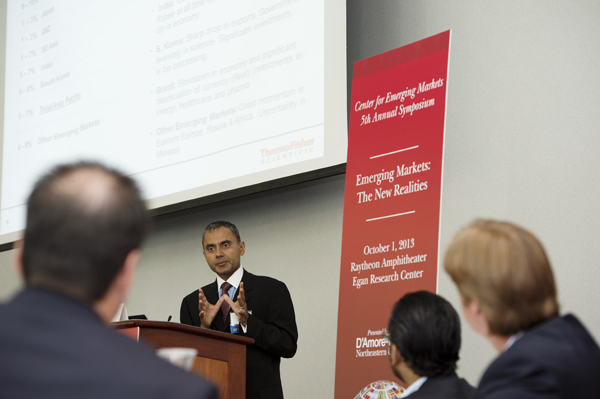Why emerging markets are slowing down

Emerging markets are currently experiencing an economic slowdown, according to scholars and business leaders who spoke at the fifth annual Emerging Markets Symposium on Tuesday at Northeastern. They pointed to inflation, a sharp drop in currency, and a downturn in foreign investments as the prominent reasons for the financial slump.
“These are not the go-go years of the 2000s,” explained Ravi Ramamurti, Distinguished Professor of International Business and Strategy in the D’Amore-McKim School of Business and the director of Northeastern’s Center for Emerging Markets. “Countries have begun to ask what this means for the future of their places in the global economy.”
Ramamurti organized the symposium, which was cosponsored by AIM International Business Council and WorldBoston. The program featured more than half a dozen speakers from academia and industry, all of whom discussed the new reality of emerging markets in Brazil, Russia, India, China, and beyond. Presenters included Dionysious Bouzos, vice president of emerging markets for Merck & Co; Sara Johnson, senior research director of global economics for IHS Global Insight; Anand Raman, editor-at-large of the Harvard Business Review; Venkat Srinivasan, founder and CEO of Rage Frameworks and EnglishHelper; and keynote speaker Syed Jafry, president of emerging markets for Thermo Fisher Scientific, the world’s largest manufacturer of life science equipment.
Northeastern students and alumni also figured prominently in the daylong event, during which they discussed their recent co-op experiences in Asia. Ran Ding, a 2013 graduate of the international business program, worked for Li & Fung, a global sourcing firm based in Hong Kong, while Britton Green, a senior international affairs major, worked for CNBC’s office in Singapore.
In his opening remarks, Hugh Courtney, dean of the D’Amore-McKim School of Business, noted Northeastern’s national leadership in the field of international business. The university’s international business program is ranked No. 8 in the nation, according to the 2014 rankings by U.S. News & World Report. “We really are the leaders in this field, and we love to bring other leaders to campus,” Courtney said. “Engaging with the community is where breakthroughs occur.”
According to Jafry, collaboration has been a key feature of Thermo Fisher Scientific’s evolving strategy in emerging markets.
“Initially we want to leverage our partners and distributors,” he explained in his keynote address, “but as we grow we want to control our own destiny by investing in building direct organizations in these areas.”
Jafry cited the firm’s work in China as an example of its progressive business strategy. Since entering the Chinese market some 30 years ago, he said, Thermo Fisher Scientific has established a strong research and development, manufacturing, and commercial infrastructure, including the development of five factories.
Its newest facility in Suzhou was designed to establish local production capabilities to meet increased customer demand in the world’s most populous country. “Our strategy is to look at China as a marketplace where we want to sell products rather than as a source of manufacturing,” Jafry explained. “China is the brightest spot in terms of revenue growth for our company,” he added.





